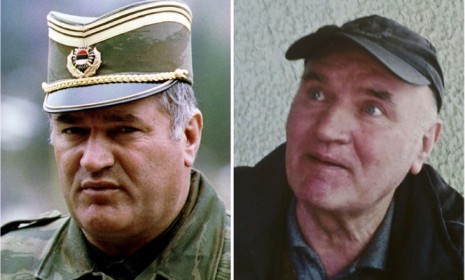4 reasons Ratko Mladic's arrest matters
The ex-Bosnian Serb general allegedly "masterminded the butchery" of the deadly Srebrenica massacre in 1995. What does his long-awaited capture mean?

A free daily email with the biggest news stories of the day – and the best features from TheWeek.com
You are now subscribed
Your newsletter sign-up was successful
Former Bosnian Serb commander Ratko Mladic faces an extradition hearing on Friday to determine whether he will face genocide charges in an international court, something human rights activists have long wanted. Serbian police arrested Mladic, who'd been in hiding for 15 years, on Thursday in a tiny village near Belgrade. Prosecutors want to put Mladic on trial for war crimes that occurred after Bosnia-Herzegovina's secession from the former Yugoslavia — including the 1995 killings of nearly 8,000 men and boys in the Muslim enclave of Srebrenica. Here, four reasons his arrest matters:
1. Mladic's arrest is a warning to other criminals
The Srebrenica massacre "was the worst ethnically motivated mass murder in Europe since World War II," says The New York Times in an editorial, and Mladic was the general "who masterminded the butchery." His arrest and trial at the International Criminal Court in The Hague "should be a warning to other butchers that they, too, will be caught and held to account, no matter how long it takes."
The Week
Escape your echo chamber. Get the facts behind the news, plus analysis from multiple perspectives.

Sign up for The Week's Free Newsletters
From our morning news briefing to a weekly Good News Newsletter, get the best of The Week delivered directly to your inbox.
From our morning news briefing to a weekly Good News Newsletter, get the best of The Week delivered directly to your inbox.
2. This strengthens the European Union
"The Mladic arrest is a good reminder of what the EU does best," says David Bosco at Foreign Policy. For years, outsiders speculated that Serbian authorities knew where Mladic was, but balked at nabbing him because of his remaining support among soldiers. But European diplomats pressed for his arrest, using Serbia's hope of joining the EU as a carrot. And now it's done, proving once again that "the EU's role in solidifying decent, stable governments in central and eastern Europe is one of its greatest accomplishments."
3. Serbia now has a brighter future
Serbian President Boris Tadic might have put it best, says Simon Tisdall at Britain's Guardian, when he said this removes "a heavy burden from Serbia and closes a page of our unfortunate history." Now Serbia can heal, and have a real shot at peace and prosperity. It might seem strange that so much could hinge on the arrest of a broken old man, but remember: "Not until Napoleon was confined on St. Helena, or Hitler died in his bunker, or Stalin died in his bed, did the wheels of history definitively and decisively turn."
A free daily email with the biggest news stories of the day – and the best features from TheWeek.com
4. It answers the prayers of war-crimes victims
"It seemed, in our instant-gratification, rapid-response world, that it took forever (actually a little under a decade) to finally get Osama bin Laden," says Susan Milligan in U.S. News, "whose death hopefully brings some closure to the families of the victims of the Sept. 11 attacks." So imagine how this arrest must feel for Mladic's victims. Let's hope his capture brings them peace of mind, and closure. Survivors are indeed celebrating, says Dejan Anastasijevic at TIME. "Justice is finally being served. It is somewhat cold, and certainly belated, but it is justice nonetheless."
-
 Nordic combined: the Winter Olympics sport that bars women
Nordic combined: the Winter Olympics sport that bars womenIn The Spotlight Female athletes excluded from participation in demanding double-discipline events at Milano-Cortina
-
 Samurai: a ‘blockbuster’ display of Japanese heritage
Samurai: a ‘blockbuster’ display of Japanese heritageThe Week Recommends British Museum show offers a ‘scintillating journey’ through ‘a world of gore, power and artistic beauty’
-
 BMW iX3: a ‘revolution’ for the German car brand
BMW iX3: a ‘revolution’ for the German car brandThe Week Recommends The electric SUV promises a ‘great balance between ride comfort and driving fun’